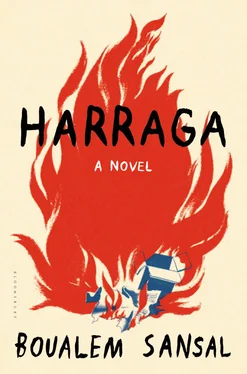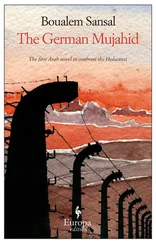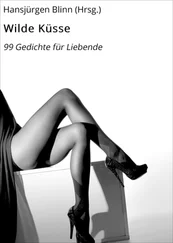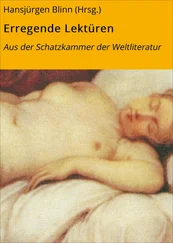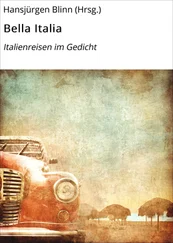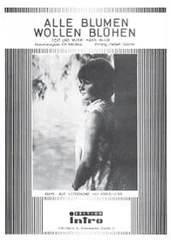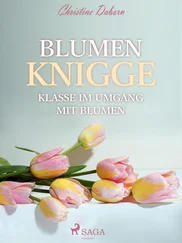‘Did your husband beat you?’
‘Snff… snff… yes.’
‘So where are you headed now… to your parents?’
‘Snff… snff… yes.’
‘Did you defy him?’
‘Snff… snff… I think so.’
‘You have the look of a good woman about you. I suppose it was the devil led you astray?’
‘Snff… snff… yes.’
‘And this man who claims to be a Muslim is letting you travel all on your own without a veil?’
‘Snff… snff… yes.’
‘Back in my day, it would have been a disgrace!’
‘Snff… snff… yes.’
‘…’
I felt tempted to upbraid him, we had inherited ‘his day’ a hundredfold, but given his age and the state of his car, I worried that his heart might burst or the fan belt of his jalopy might snap. I would be to blame for their deaths, for the martyrdom of a devout Muslim and the demise of an ancient rustbucket hallowed by the hundreds of pilgrims and who knew how many imams who had parked their posteriors on these seats. And besides, I wasn’t really listening to him, I had no wish to add to my sorrows the ravings of some oddball about how the female of the species likes to cavort with the devil.
On the second leg of the journey, he broached the subject of the punishments to be inflicted on wives according to the faults committed by them, their sisters, their daughters and their confidantes. A personal and a collective scale underpinned by an absolutist rhetoric. Guilty or not, they deserved to be punished, that was the gist of it. He talked about the talaq , but he seemed to think repudiation was a convoluted process suitable only as a last resort. What, did I hear right? I was about to demand that he explain what, exactly, was convoluted about a man throwing his wife out into the street or breaking her neck, and what precisely qualified as a ‘last resort’, but he didn’t wait, he had already launched into a comparative analysis of flogging and stoning before moving on to his favourite method of chastisement: having the woman clapped in irons and tossed into the bottom of a well for seven days and seven nights after which, with feverish devotion, the well is filled in. He talked at length about this authentically corrective ritual, largely forgotten these days probably because most wells are dry. He went on to discuss cremation, throat-cutting, quartering, the boiling of all or parts of the body, pouring molten lead into the ears or the nostrils and who knows what all — the Muslim world being as broad as it is rich in such pièces de résistance , he cast a wide net. It all sounded rather old-fashioned and ignorant of state-of-the-art techniques. Good God, they could simply put women in factories, gas them, electrocute them by the dozen, by the thousand, dissolve them in acid — what else? — turn them into candles, into polish. Better yet, melt them down and turn them into some revolutionary alloy, use them as fertiliser, or maybe for road resurfacing — they would provide a much more flexible surface. But I wasn’t really listening, I wasn’t really looking; we would soon be arriving at the convent and my heart was hammering. I decided I would send him away and tell him to come back in about an hour. I would give him some money and suggest he unwind in a nearby café maure — that mysterious space where never within the memory of man has woman set foot. He rolled his eyes, he could not understand what a creature who had defied Qur’anic law was doing at a Christian refuge.
The convent of Notre Dame des Pauvres is a squat building covered with wild vines set well back from the road that connects Blida to Chréa next to an overgrown path that smells sweetly of the Mediterranean. Everything about the place seems to smile, but it would be unwise to trust to appearances; there is a microclimate that exists in the mountains that look out towards the sea, it is a whimsical place where grass yellows before turning green and the blue of the sky can veer unexpectedly from white to red. No barometer on earth can comprehend its neuroses, it changes its mantle of cloud the way a person changes their shirt. Clouds scud past, heedless to the prayers of empty rain barrels, they linger for a moment in the heavens before heading for the sea there to surrender to the splendours of the water-cycle. How remote the sordid streets of Algiers seem, how strange the sky! The taxi slipped into first gear and climbed slowly between hedgerows of whispering spikes and thorns. It valiantly juddered along, strewing bolts and washers and, at every hairpin bend, another cog fell off the chassis. Under my breath, I recited a pious rosary of heave-hos. There is no shortage of cicadas, they are all one can hear. After a few scant minutes it feels as though, but for cicadas on earth and God in His heaven, nothing else exists. Blazing sunshine is guaranteed year round, but for the turning of the season when there is one whole week of actual snow, something skiing buffs in the days before the troubles spoke of as though it lasted twelve months of the year. Once more I thought of Camus, a son of the soil; he had spent time here among the crickets and the olive groves before exiling himself to the north pole, to the grim absurdities that dog us from birth to death. I think about Rachid Mimouni, another son of the soil who people say spent time here before becoming a harraga and leaving to die over there, in Tangiers the magnificent, gateway to every destination. It is piteous to be so impoverished. From our native soil we expect abundance and joy, not exile and death. Who tumbles into darkness lapses into violence is a saying that well expresses the descent into hell, but up in these mountains, ringed by radiant light and serenaded by homoptera, how could anyone be malicious or miserable without feeling ashamed? Absurdity again, madness again.
The door is sturdy, carved from solid wood and set on ancient iron hinges. Beyond it, well protected, silence reigns. It conjures a world of timeless mysteries, of lives lived plagued by worries and thorny questions, crippled or exalted by doubts and surely denied happiness — the elixir we poor wretched, helpless creatures do our utmost to filch where we can to avoid annihilation — or quite the reverse, spared the terrible misery that keeps the rest of us clinging to life like a buoy in spite of everything. I don’t know what to think about it, personally, I live in utter solitude in a ramshackle mansion surrounded by a vast prison that is falling down about our ears and taking us all with it.
On the façade, the name of the institution was carved in relief above the lintel, a single slab of pink marble: Convent of the Sisters of Our Lady of the Poor . The faint air of neglect hinted that the members of the order could probably be counted on the fingers of half a hand. Where are the beggars, Lord of the poor? Where are the nuns, the churchwardens and the donors rubbing their hands with glee to see their money so wisely used? Where are the processions, the saint’s-day celebrations, where is the smell of warm bread broken in the spirit of fraternity? Everything is in ruins, all our possessions and those of our friends, all our good wishes for happiness have been swept away.
The door made no sound and I had only my fists to make myself heard. What could I do?
An old woman sitting on a hillock, a basket at her feet, a bundle of firewood on her head, was struggling to catch her breath before continuing her journey into the unknown. Her wrinkled face suddenly came to life, she stared at me as though I were a freak of nature and spoke to me: ‘Where’d you spring from, you? The great door is for religion, if it’s healing you want, it’s round the other side — a white door with a green cross, you’ll see.’
She said the words as though speaking some great, evident truth, the care of the body is not that of the soul. Was she right or wrong? I thanked her with a blink, it was the best I could do, I had a lump in my throat and the rest of my being refused to respond. I needed only to hear Sister Anne say the last word to fall silent for ever. I knew, I could feel it, when I left the convent my life would be over.
Читать дальше
